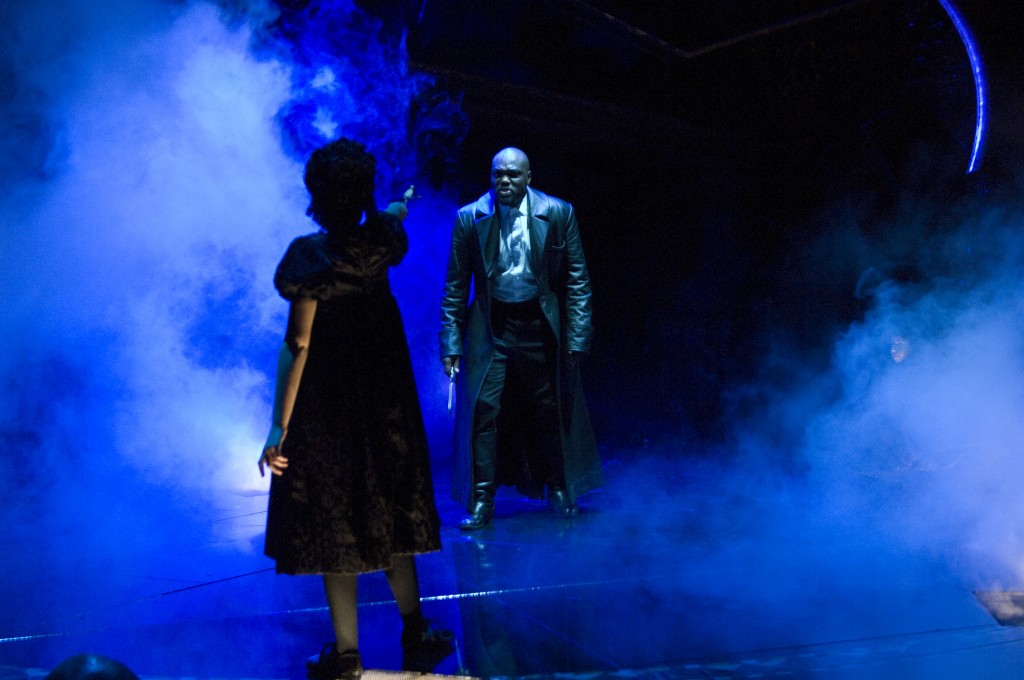
Above: Macbeth (Peter Macon) confronts a ghostly apparition in Ashland. Inset below: Diana (Emily Sophia Knapp) meets with Bertram (Danforth Comins). Photos: Jenny Graham/Oregon Shakespeare Festival/2009.
One of the advantages of visiting the Oregon Shakespeare Festival as late as I did this year is that every production (and I saw all nine still running in an 11-show season) was fully settled in, as ripe and ready as it’s ever going to be. Macbeth and The Music Man opened in February. The three outdoor shows opened in June.
Even the most recent addition to the repertory, Paradise Lost, began preview performances July 22, and I saw it Sept. 1. In most regional theater companies, with their three-week runs, it would’ve been shut down before then. Long live the extended run! (And so it will, for a while: Outdoor shows continue through Oct. 11, and the indoor season through Nov. 1, which gives you time and opportunity to make the southward jaunt.)
So what’s the score?
Overall, I think, this has been a strong season, and maybe more important, a promise of stronger seasons to come as Bill Rauch, who took over as artistic director last season, couples his ideas for change with the festival’s many existing strengths.
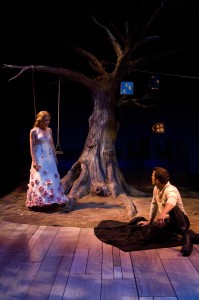 This year we’ve seen some genuinely interesting directing approaches that put a strong personal stamp on the shows yet remain at the service of the literature — a hallmark (perhaps the hallmark) of the Ashland style. The season includes a couple of knockouts (Equivocation and The Servant of Two Masters), excellent work on the always problematical Macbeth and All’s Well That Ends Well, and illuminating moments of theater even in the least successful shows.
This year we’ve seen some genuinely interesting directing approaches that put a strong personal stamp on the shows yet remain at the service of the literature — a hallmark (perhaps the hallmark) of the Ashland style. The season includes a couple of knockouts (Equivocation and The Servant of Two Masters), excellent work on the always problematical Macbeth and All’s Well That Ends Well, and illuminating moments of theater even in the least successful shows.
Not that the season and company don’t have their problems, as Los Angeles Times critic Charles McNulty wrote a couple of weeks ago. His piece (read it here) has been racing across the Internet, ruffling feathers and wounding feelings among Ashland fans and company members alike.
In fact it’s a perceptive essay, and ought to be taken seriously. I don’t happen to agree with all of it, and it’s too bad it’s based on just a four-show sampling, with only Equivocation among the season’s best shows. McNulty also saw Henry VIII, which I thought beautifully designed and well-performed by its leads in a play that’s largely a losing cause; plus Paradise Lost and The Music Man.
But if McNulty chose to stress the festival’s faults over its achievements, I think it’s because he genuinely meant it as a challenge to improve. And he hit on several truths. When things go wrong the festival does fall back on a declamatory, connect-the-dots style that keeps the plot going but can drain the dramatic life from a show. That’s always seemed to me a product of the need to shout and gesture large on the big outdoor stage, although that’s become less a necessity since the addition several years ago of the Allen Pavilion, which cuts out a fair amount of the ambient noise. The problem is a bit like the one for grand opera: finding performers who can project into those massive spaces without straining or losing nuance. The bad habits sometimes get brought indoors, too: I felt some unnecessary vocal piercing, for instance, in Paradise Lost.
On the other hand, I think that what McNulty hears as shouting is sometimes instead a sort of classical fearlessness — a willingness to open up and play large with the language in an age that’s uncomfortable with hearts on sleeves (particularly in Los Angeles, home of the movie industry, where underplaying is a necessity of the film medium). Unlike a musical score, a play script doesn’t make notation of the range from pianissimo to triple forte: Matters of volume, contrast and vocal shape are for the director and performers to decide. That’s one of the reasons we argue about theater so much. But I’m willing to give festival talents such as Richard Elmore, Linda Alper, Robin Goodrin Nordli and Peter Macon first crack at figuring out the music in their roles (not that I might not argue with their choices after the fact). Continue reading Ashland 5: In addition, furthermore, and to conclude →
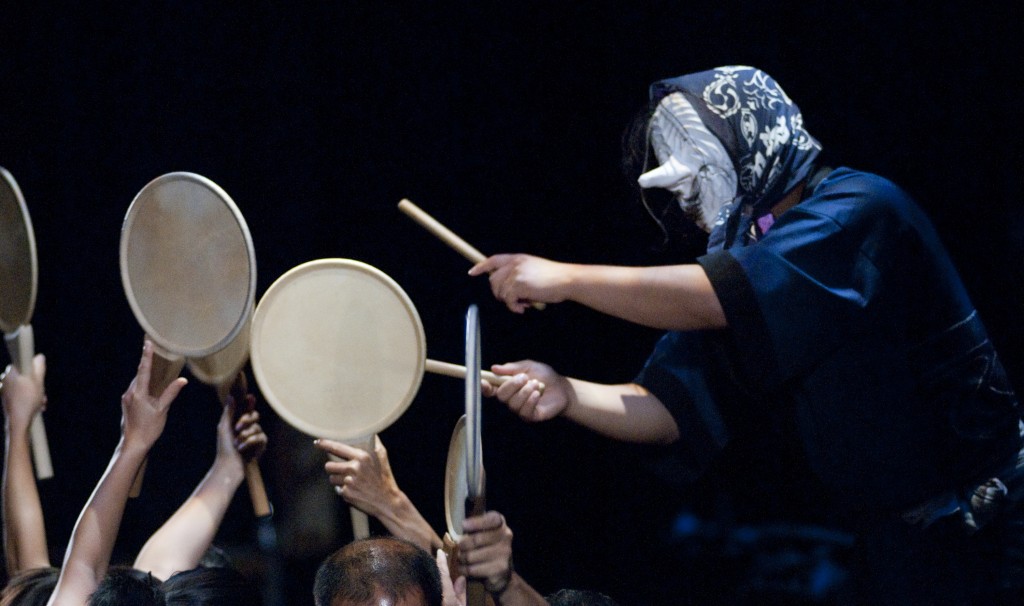 Portland Taiko. Rich Iwasaki/2009
Portland Taiko. Rich Iwasaki/2009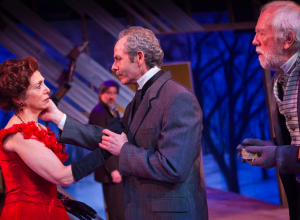 There isn’t much story to The Cherry Orchard, but there are themes, counter-themes, motifs. It’s chamber music, and the way we hear it can be startlingly different from production to production, depending not just on our own life experiences (interpreting Chekhov relies to an extreme on what the audience brings to it) but also on the emphases of interpretation on the stage: Do we concentrate on the cello tonight, or the bassoon? In truth, I suspect that even more so than ordinarily, every member of the audience sees a different play when watching Chekhov.
There isn’t much story to The Cherry Orchard, but there are themes, counter-themes, motifs. It’s chamber music, and the way we hear it can be startlingly different from production to production, depending not just on our own life experiences (interpreting Chekhov relies to an extreme on what the audience brings to it) but also on the emphases of interpretation on the stage: Do we concentrate on the cello tonight, or the bassoon? In truth, I suspect that even more so than ordinarily, every member of the audience sees a different play when watching Chekhov.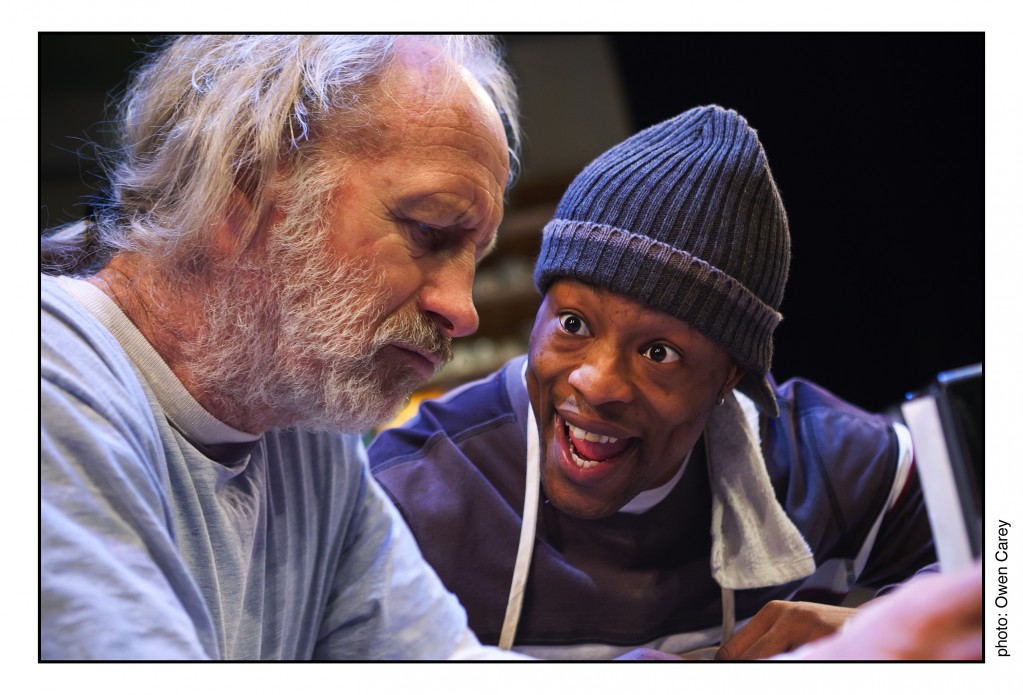

 This year we’ve seen some genuinely interesting directing approaches that put a strong personal stamp on the shows yet remain at the service of the literature — a hallmark (perhaps the hallmark) of the Ashland style. The season includes a couple of knockouts (Equivocation and The Servant of Two Masters), excellent work on the always problematical Macbeth and All’s Well That Ends Well, and illuminating moments of theater even in the least successful shows.
This year we’ve seen some genuinely interesting directing approaches that put a strong personal stamp on the shows yet remain at the service of the literature — a hallmark (perhaps the hallmark) of the Ashland style. The season includes a couple of knockouts (Equivocation and The Servant of Two Masters), excellent work on the always problematical Macbeth and All’s Well That Ends Well, and illuminating moments of theater even in the least successful shows.